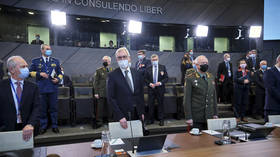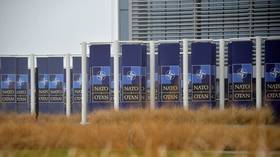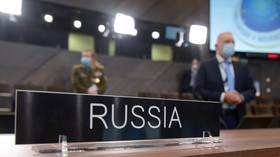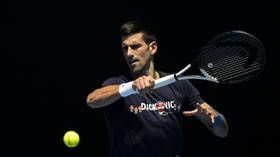Can Russia do a deal with the West?

A diplomatic marathon that saw Russia hold talks with the US and NATO on European security guarantees, this week, ended with the bloc offering to address a range of issues it had previously refused to even discuss with Moscow.
This article originally appeared in the Kommersant newspaper
The areas now apparently open for negotiation include reciprocal limitations on deploying missile systems, a reduction in the scale of military exercises, and the reopening of military communication channels. At the same time, NATO is not going to renounce its Open Door policy, with Ukraine’s aspirations to join a key area of contention. Neither will it remove its troops and infrastructure stationed in the former Warsaw Pact nations that joined after 1997, as Moscow has requested. In short, the situation remains tense and unpredictable.
Other areas that have seen progress made include Russian President Vladimir Putin’s initiative to freeze the deployment in Europe of short- and intermediate-range missiles banned by the now-defunct Intermediate-Range Nuclear Forces Treaty. President Putin first put forward this plan in September 2019, soon after the treaty was terminated, and, a year later, presented a new version of this proposal to the West. Neither draft sparked any interest in the US or among its allies. Only France publicly announced it was willing to discuss it, but no substantive talks happened. American officials, including NATO Secretary General Jens Stoltenberg, repeatedly said the Russian initiative was “not a credible offer” and had no real prospects.
Recently, Russia began to exert pressure, in terms of both force and diplomacy, by reportedly amassing troops near its border with Ukraine and presenting two draft agreements with ultimatum-like demands to the US and NATO. This made Western countries change their mind.
At the Geneva and Brussels talks, the US and NATO representatives said – publicly, too – that they were willing to have a discussion with Russia about the aforementioned reciprocal limitations on missile deployment.
Moreover, the US and other NATO nations declared they were ready to talk with Russia about de-escalation measures. The steps presented by the Western diplomats overlap to a large extent with what Moscow has been pushing for since 2014, when NATO suspended almost all practical cooperation with Russia. They include reducing the scale and intensity of military exercises in certain areas, improving mechanisms to prevent dangerous military incidents, and reopening military communication channels.
At the NATO-Russia Council meeting, the Russian delegation was invited to reestablish its office at the NATO HQ in Brussels on the condition that the NATO liaison office would reopen in Moscow. Russia ended its outreach to NATO after the alliance expelled eight members of Russia’s mission (already much reduced after the previous two rounds of expulsions), claiming they were intelligence officers. Perhaps now NATO will consider the possibility of allowing Russia’s mission to have more staff, so its size is more acceptable by Moscow’s standards.
Overall, NATO countries – both publicly and behind closed doors – mostly chose the word “dialogue” when commenting on the kind of relations with Russia they would like to see.
“I strongly believe in NATO’s approach to Russia, which is what we call the dual-track approach. We need to be firm, we need to be strong, we need to be united. But at the same time, we are always willing to engage in a meaningful dialogue with Russia. Russia is our neighbor and we need to sit down and address common security concerns together. And we have done that before. It’s possible,” said Stoltenberg.
It is unclear yet, however, whether Russia will be ready to resume substantial talks with the West, as the US and NATO have refused point-blank to discuss the two issues that are of crucial importance to Moscow: Russia wants the bloc to stop expanding to the east and to withdraw troops and remove infrastructure from the countries that joined the alliance post 1997. Both Stoltenberg and US Deputy Secretary of State Wendy Sherman recently delivered their opinion in Brussels, and they did so in quite clear and somewhat similar terms, asserting that no compromise with Russia was possible in this regard.
The same goes for the question of Ukraine’s hopes to join NATO, which Moscow vehemently opposes. Stoltenberg said, “All allies are united on the core principle that each and every nation has the right to choose their own path. Allies totally agree that it is only Ukraine and 30 allies that can decide when Ukraine is ready to become a NATO member. No one else has anything to say and, of course, Russia doesn’t have a veto on whether Ukraine can become a NATO member. Allies are ready to support Ukraine on this path towards membership.”
Russian Deputy Foreign Minister Alexander Grushko, who headed up the Russian delegation at the NATO talks, stated that Russia did not find this acceptable: “NATO understands selectively the principle of the indivisibility of security. In the eyes of the bloc, it exists only for the members of the alliance, and NATO is not willing to factor in the security interests of others at all. We’re convinced that any attempts to build a security system against Russia without Russia’s involvement will never work. We won’t allow it.”
“If NATO moves on to a policy of containment, then there will be a policy of counter-containment from our side. If there is deterrence, there will be counter-deterrence. If there is a search for vulnerabilities in the Russian defense system, then there will also be a search for vulnerabilities in NATO. This is not our choice, but there will be no other path if we fail to reverse the current very dangerous course of events.”
Grushko went on to say that Russia would “take all necessary measures to fend off the threat by military means if it does not work out with political means,” adding that it was “the only way.” He didn’t expand on what military means these might be exactly.
He particularly emphasized the fact that Russia would insist on NATO considering all its proposals and not cherry-picking Moscow’s demands.
“Our package of proposals is not a random collection of bits and pieces,” he said, “but a system to be considered in its entirety. You cannot just pick the bits you like and discard the rest.”
At the same time, he made it clear that, despite its obvious differences with the Western partners, Russia was ready to continue with the talks. He called on NATO to draft its own vision for Europe’s security architecture, just as Russia did last December, in order that there could be further discussion. NATO expressed the hope that Russia would be open to meet again to discuss in detail those issues the parties actually agreed on. But both the US and NATO representatives threatened Russia with serious consequences should Moscow continue to exhibit what they called “aggression” in general and “aggression” towards Ukraine in particular.
On Thursday, Russia’s proposals and demands were to be considered by the Organization for Security and Co-operation in Europe (OSCE) in Vienna. A heated discussion was on the cards, because both Ukraine and Georgia are OSCE members. However, unlike the US or NATO, the OSCE wields little decision-making power.
This article originally appeared in Kommersant.

















